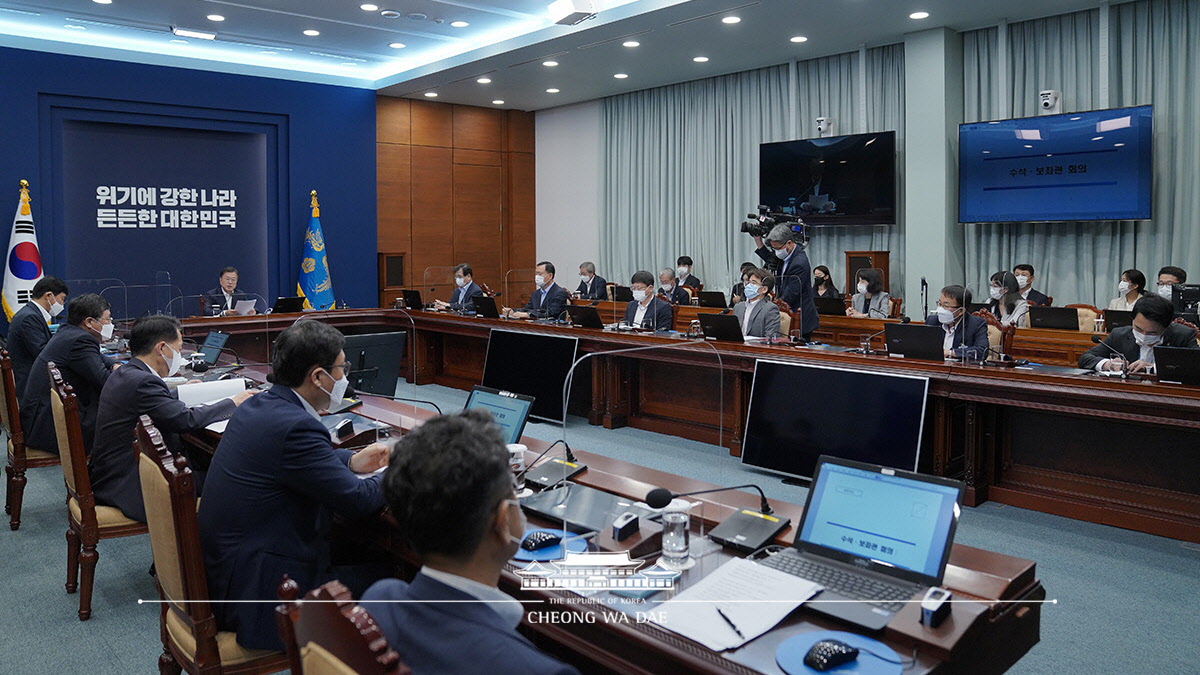이 웹사이트는 제19대 대통령 임기 종료에 따라 대통령기록관이 「대통령기록물 관리에 관한 법률」에 의해 이관받아 서비스하는 대통령기록물입니다. 자료의 열람만 가능하며 수정 · 추가 · 삭제는 불가능합니다.
다만, 「개인정보보호법」에 의하여 개인의 정보를 보호받기 원하시는 분은 관련 내용(요청자, 요청내용, 연락처, 글위치)을 대통령 웹기록물 담당자(044-211-2253)에게 요청해 주시면 신속히 검토하여 조치해 드리겠습니다. 감사합니다.
SPEECHES & REMARKS
BRIEFINGS

At today’s meeting again, we have outside experts with us to discuss items on the agenda – Executive Director Lee Sang-hun of the Korea Energy Agency’s New and Renewable Energy Center and Vice Chair Kim Yong-ki of the Presidential Committee on Job Creation. Thank you for joining us.
Vaccination rates are increasing around the world, but alarm bells are going off again because the highly-contagious COVID-19 Delta variant is spreading. As the number of recently falling confirmed COVID-19 cases has started to rise once more, the World Health Organization is warning that “We are in a very dangerous period of this pandemic.” Even though our country is controlling COVID-19 relatively well, the situation here is also unusual. More than 80 percent of the total confirmed cases are concentrated in the Seoul metropolitan area and the number of confirmed cases is soaring primarily among socially active young people. The new daily caseload has been fluctuating around 800.
The arrival of the Delta variant here and growing domestic infection clusters are raising concerns further. The climbing case count among a few people going about daily activities in various parts of the country and the high basic reproduction number attest to a grave situation where it’s difficult to contain the spread of infections. We are in an emergency where a small breach in epidemic prevention and control coupled with an increase in summer vacation traffic can lead to a spike in the spread of the disease anytime. We have to keep a tight rein on anti-epidemic measures with yet another heightened alert while expeditiously implementing vaccinations as scheduled.
Fortunately, vaccinations are proceeding as planned thanks to strong public participation. About 30 percent of the total population has received at least one dose, and 10 percent are fully vaccinated as targets for the first half of the year have been repeatedly exceeded. With prioritized vaccination of groups at high-risk for COVID-19 well underway, the percentage of confirmed cases among people aged 60 and older has dropped to single digits. Simultaneously, the percentages of severely and critically ill patients and case fatalities have been significantly lowered. These are signs of the positive effects.
Beginning this month, we will have a more stable and sufficient supply of vaccines. International cooperation is ongoing to quickly secure vaccine supplies. The Government will further quicken the pace of vaccinations by entrusting an additional 14,000 private medical institutions with administering mRNA vaccines like those produced by Pfizer and Moderna. Once it is determined that the benefits outweigh the risks, cross-vaccination will be used to improve the vaccines’ effectiveness against virus variants and shorten intervals between shots. The Government will also move up the timetable for reaching herd immunity, just as we surpassed our target for the first half of the year.
The key to success is to bring COVID-19 under control again. I ask the disease control authorities to work with local governments to respond to the situation in an extraordinary manner. We must intensively inspect high-risk facilities and strictly apply the one-strike rule that calls for immediately suspending the operations of a business that is violating the strengthened Infectious Disease Control and Prevention Act. We have no choice but to take firm legal measures against collective action that violates epidemic prevention guidelines, such as unlawful mass rallies. In particular, as the situation in the Seoul metropolitan area remains grave, I urge local governments within the area to use every means available with an even more elevated sense of responsibility to prevent any breach in their epidemic prevention networks.
We cannot help but request public cooperation as well. The ever-evolving COVID-19 variants are intensively seeping through the cracks. If we let our guard down even a bit, we will end up being a target of the virus anytime, anywhere. I ask our people to bear in mind once again that complying with such basic guidelines as wearing a mask and social distancing is the most effective defense measure.
The current situation shows that it is never easy to strike a balance between the economy and epidemic prevention and control. We should not let microbusiness owners and the self-employed continue to suffer. However, clearly, “there is no economy without epidemic prevention and control.” We must catch those two rabbits regardless of the circumstances. Everyone finds this situation exhausting, but I ask all of you once again to stay strong.
The monsoon season has come into full swing from last weekend. Torrential downpours have continued from the outset. If abnormal weather conditions persist, we can expect damage from torrential rains this year again. A typhoon may come. Safety measures should be put in place ahead of time – starting with places prone to landslides or flooding, such as cut slopes, hills covered with solar panels, lowlands and seashores. In particular, recovery work must be completed as soon as possible in areas still not fully restored from last year’s flood damage. Above all, preventing human casualties is the top priority. I urge you to thoroughly limit access to hazardous areas in advance and notify people of dangers instantly, so they will be sure to follow emergency instructions.
At a time when COVID-19 prevention and control is putting immense pressure on us, we must also brace for summertime disasters. Consequently, frontline public officials from local governments and relevant ministries and agencies will face significantly harder work. I offer them words of comfort and encouragement. The presidential campaign season has come again, but the Government should focus solely on people’s livelihoods. Let us do all we can to make sure that there isn’t even the slightest bit of negligence in protecting the lives and safety of the people.
Thank you.



